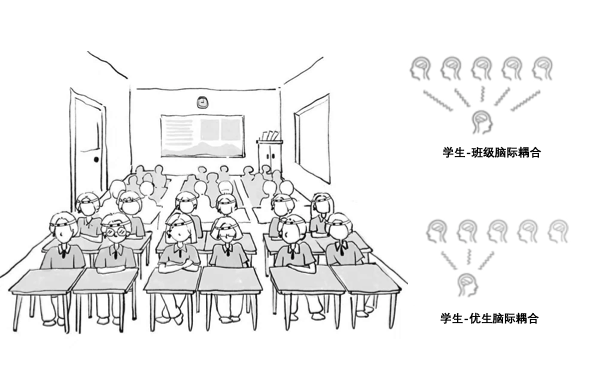The classroom is one of the most important settings for formal human learning. Subject courses (such as language arts, mathematics, and English) are the fundamental organizational structures throughout basic education. Understanding subject differences and grasping subject characteristics have significant importance for teaching practice. Zhang Dan's research group, in collaboration with Zhang Yu's research group from the Institute of Education at Tsinghua University, employed group brain scanning technology to collect dual-channel frontal electroencephalography (EEG) data from all students in a class during Chinese language and mathematics lessons in real classroom learning situations, exploring the neuroscientific differences in successful learning across different subjects.

Figure 1. Real Classroom Research Setting and Inter-Brain Coupling Analysis
The research team conducted a semester-long real classroom EEG tracking data collection, using academic performance as an indicator of learning effectiveness, and employed inter-brain coupling analysis methods to explore the neural representations of effective learning in different subjects (Figure 1). The study found that mathematics and Chinese language learning correspond to different neural representations of inter-brain coupling: during mathematics classroom learning, the degree of student-class inter-brain coupling was significantly positively correlated with their mathematics academic performance, while during Chinese language classroom learning, the degree of student-high performer inter-brain coupling was significantly positively correlated with their Chinese language academic performance.
These research results align with the disciplinary patterns represented by mathematics and Chinese language as hard and soft subjects respectively: mathematics learning emphasizes the mastery and application of definite knowledge, and student-class inter-brain coupling can reflect the degree of individual engagement with the teaching content, serving as a reliable indicator for evaluating learning outcomes; Chinese language learning requires more personal construction and understanding, and the neural activity during the learning process of high academic performance students can better represent effective learning.
These research findings provide empirical evidence at the neural level from real classroom context learning process measurements for understanding subject differences. The work has been officially accepted and published online in the important learning science journal npj Science of Learning. Dr. Chen Jingjing, a postdoctoral researcher in the Department of Psychology at Tsinghua University, is the first author of this paper, and Associate Professor Zhang Dan from the Department of Psychology and Associate Professor Zhang Yu from the Institute of Education at Tsinghua University are the co-corresponding authors.
This research was supported by National Natural Science Foundation of China Education Information Technology Direction (F0701) projects (61977041, 62107025, 62177030).
Paper link:
https://www.nature.com/articles/s41539-023-00162-1

